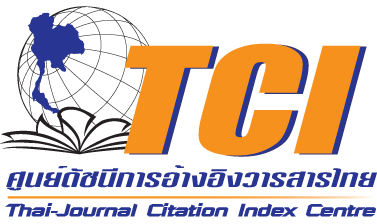Developing Mathematical Skills in First-Year Preschoolers with a Dough Modeling Activity in an International Kindergarten in Bangkok, Thailand
Keywords:
Mathematics Skills Development, Early Childhood Skill Development, Game-Based Learning, Play-Based LearningAbstract
Through the use of a dough modeling activity, this study sought to determine the level of mathematical skills development of preschoolers. The sample group consisted of 17 first-year preschoolers from an international kindergarten in Bangkok. The research instruments were a set of tasks for developing mathematical skills through the dough modeling activity and a mathematical skills assessment form for early childhood children. The statistics used were percentage, mean, SD., and paired t-Test. The study's findings indicated that the dough modeling activity helped first-year preschoolers improve their mathematical abilities, with statistical significance at the .01 level, and develop important basic mathematical skills in each of the four skills: sequencing, counting, measuring, and categorizing. The children's mathematical skill levels were significantly higher than before the development at a statistical level of .01.
References
Armai, R., Boonrat, A., & Tassaro, C. (2020). Development of Basic Mathematical Skills for Pre-school Children by Using Creative Arts Activities from Recycled Material of Schools under the Office of Private Education, Satun Province. Journal of Human and Society: Sisaket Rajabhat University, 4(2), 85-106.
Cayang, J. A., & Ursabia, E. M. (2024). Leveling up Mathematical Skills: The Effectiveness of Game-Based Learning. Journal of Interdisciplinary Perspectives, 2(7), 784-791.
Cojocariu, V., & Boghian, I. (2014). Teaching the Relevance of Game-Based Learning to Preschool and Primary Teachers. Procedia-Social and Behavioral Sciences, 142(2014), 640-646.
De Chambrier, A., Baye, A., Tinnes-Vigne, M., Tazouti, Y., Vlassis, J., Poncelet, D., & Giauque, N. (2021). Enhancing Children’s Numerical Skills Through a Play-Based Intervention at Kindergarten and at Home: A Quasi-Experimental Study, Early Childhood Research Quarterly, 54, 164-178.
Doungkeid, A., Thanachaikhan, N., & Panyapruk, S. (2015).Development of Basic Mathematical Skills of Year 1 Kindergarten Students Using Northern Cultural Local Activities. CRRU: Graduate School Journal, 8(17), 226-235.
Farooqi, M. T. K., Kanwal, S., & Qayinat, I. (2024). The Study of Game-Based Learning Approaches, Effectiveness and Their Limitations in Early Childhood Education. Journal of Policy Research, 10(2), 844-852.
Mingmongkol, C., Swekwi, U., & Lormanenoprat, K. (2022). Promoting Mathematical Basic Skills through 6 Daily Activities for Early Childhood. MBU Education Journal: Faculty of Education Mahamakut Buddhist University, 10(1), 205-229.
Puncreobutr, V. (2015). The Emotional Intelligence of Children’s Behavior in an Attentive Parenting Style of Kindergarten School with Reference to Nakhon Ratchasima Province. St Theresa Journal of Humanities and Social Sciences, 1(1), 140-149.
Puncreobutr, V., & Kitratporn, P. (2017). Listening Ability and Initiative, and Creative Ideas of Primary 1 Students by Using Story Telling Activity. Human Resource Management & Organizational Behavior eJournal, 8(13), 1-8.
Puncreobutr, V., & Rattanatumma, T. (2016). Shortage of Mathematics Teachers in Thai Basic Education Level. Journal of Education and Practice, 7(12), 205-210.
Van, O. B., & Duijkers, D. (2013). Teaching in a Play-Based Curriculum: Theory, Practice and Evidence of Development Education for Young Children. Journal of Curriculum Studies, 45(4), 511-534.
Vlassis, J., Baye, A., Auquiere, A., De Chambrier, A., Direndonck, C., Giauque, N., Kerger, S., Luxembourger, C., Poncelet, D., Tinnes-Vigne, M., Tazouti, Y., & Fagnant, A. (2022). Developing Arithmetic Skill in Kindergarten through a Game-Based Approach: A Major Issue for Learners and a Challenge for Teachers. International Journal of Early Years Education, DOI: 10.1080/09669760.2022.2138740
Vogt, f., Hauser, B., Stebler, R., Rechsteiner, K., & Urech, C. (2018). Learning through Play: Pedagogy and Learning Outcomes in Early Childhood Mathematics. European Early Childhood Education Research Journal, 26(4), 589-603.
Weisberg, D. S., Hirsh-pasek, K., Golinkoff, R. M., Kittrredge, A. K., & Klahr, D. (2016). Guided Play: Principles and Practices. Current Directions in Psychological Science, 25(3), 177-182.
Wickstrom, H., Pyle, A., & Deluca, C. (2019). Does Theory Translate Into Practice? An Observational Study of Current Mathematics Pedagogies in Play-Based Kindergarten. Early Childhood Education Journal, 47(3), 287-295.







